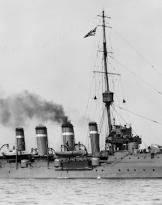It will be for the history of national anthems in which the two countries cite each other ("the eagle of Austria drank Polish blood with the Cossack and his heart burned" and "march from Italy to Poland, Dabrowski"), will be for a nice meme that circulated a few months ago about the devastating misfortune of Poland in being close between strong and aggressive neighboring countries, the fact is that today, to celebrate the eightieth anniversary of the German attack on the Polish Republic and the beginning of the Second War world, we want to pay tribute to a true hero, Colonel Kazimierz Mastalerz (photo), who inflicted - with the office of Krojanty - the first defeat to the German Armed Forces in the Hitler era.
To begin with, we erase an urban legend: Poland in that September 1939 in which it found itself withstanding the collision with the strongest land power in Europe, did not send soldiers on horseback to be massacred in clashes with the tanks. All European countries, at least until the 1945, had operational cavalry squadrons. The reason is tactical and this is explained by then-sergeant major Giancarlo Cioffi, who participated in the victorious Italian post in Isbuscenskij, against the Soviet infantry: "The soldier on foot, when faced with the charge of a cavalry squadron and the ground vibrates, the only thing he feels is panic".

Before you chuckle at the idea of Polish ulanos against the Nazi war machine, imagine yourself as soon as you get off a truck and armed with a gun or rifle, with a pack of angry dogs that run towards you at an indescribable speed ...
Let's erase another falsehood: that the Molotov-Ribbentrop Pact of 19 August 1939 between Hitler's Germany and Stalin's Soviet Union was only "tactical". Suffice it to say that Soviet and German officers and troops lovingly paraded during the transfer of Brest under Soviet control, just five weeks later. Here, this agreement is the cause of the conflict and this heroic battle.
Then, let's try to understand the scenario: the first rifleman battalion and some tactical units escaped the Battle of Chojnice and are retreating to go to defend Warsaw. THE 76th German regiment is preparing to take sides to prevent them in transit and for this it is crossing the Pomerania, up to that moment undisturbed, given that the defensive alignment along the German-Polish border was easily missed. Mastalerz does not consider them devoid of fuel, as claimed by Nazi propaganda to reduce the impact of the disaster, nor underestimate the strength of the enemy: very simply, he decides to shield the withdrawal of friendly forces. He does it with an 250 men against 800.
The Polish cavalry charge impressed the Germans to such an extent that it caused a delay in the offensive of the 20th German Motorized Infantry Division that it even thought of a tactical retreat. It took the intervention of gen. Guderian, who in his memoirs still remembered his staff with helmets on their heads and intent on preparing an anti-tank weapon for a possible Polish cavalry attack. Panic and heroism could more than the superiority of men and means ...
As for Mastalerz, he lost his life before evening, in an attempt to save the commander of the first cavalry squadron, Eugeniusz wieściak.
Photo: web












